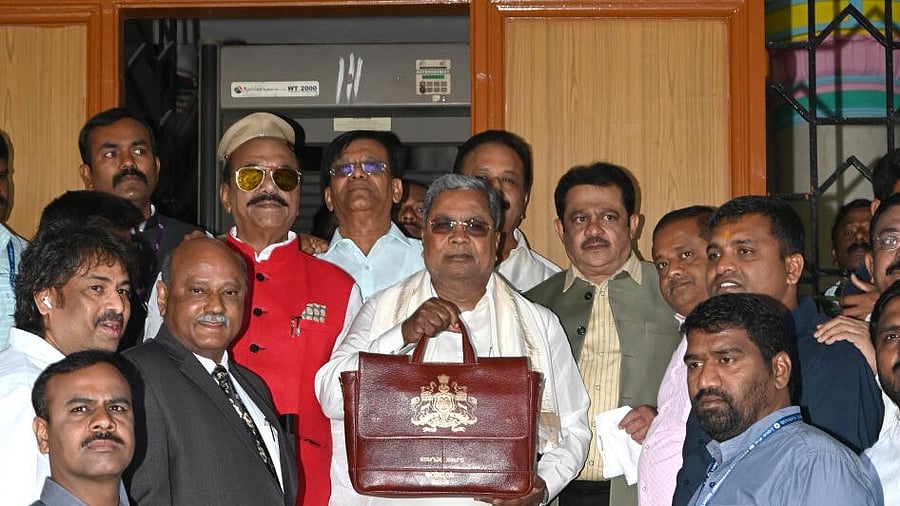
Chief Minister Siddaramaiah arrives with a budget bag during the Karnataka budget 2024 at Vidhana Soudha in Bengaluru.
Credit: DH Photo
Last Friday, Karnataka CM Siddaramaiah, in the longest budget speech ever to be delivered in the Assembly, took us through many long-winded explanations. While the destination was right and fundamentally different from the BJP’s, the chosen path presents many challenges with steep climbs, slippery slopes, and sharp edges. A misstep could trigger a financial crisis, hindering the delivery of the growth and well-being our people deserve. Navigating this successfully relies on some luck and addressing significant leakages in the system, a task that may prove challenging for the Congress government.
The CM’s thesis is simple and correct: growth without equality, dignity, and security is an undesirable goal for our people. The callous, chest-thumping of big economic numbers as a holy grail—like GDP of $5 trillion—as Narendra Modi and the BJP ministers have been doing, hides the fact that inequality is rising, jobs are scarce, and most of the growth and its benefits are going to a limited few. While this is unfair in itself, it is also problematic because of the undue power that goes with those benefits. For example, most of the media and political power are controlled by these few. The country’s resources serve their purpose, with a trickle down for the rest. The “common man” is left insecure about his livelihood, job, and dignity to be able to live without having to beg for the simple basics. Go out of your comfortable home and the security of your job, rental income, or investment income to the areas where millions of poor people live. See them struggle to pay school fees for their children’s education or hospital fees for their elderly parents’ care. Then you can understand the logic of the CM’s thesis. It is at the heart of our democracy and the intent of our Constitution.
But the road to get there is fraught with danger, and that is where the Congress government may find it difficult to navigate.
Firstly, the investment in the critical areas of education and health is too low. Though there is a significant increase in this budget of 29% in education and 17% in health, as a percentage of the budget, it remains the same or lower than it was five years ago—just 10.8% and 4.4%, respectively. Contrast this with the Delhi government, which doubled the budget on education and followed it up with efficient execution. The result was empowerment of the poor, middle class, and youth.
Secondly, capital expenditure has been kept constant at about Rs 55,000 crore, less than it was two years ago. After accounting for inflation, it means a decrease in real spend. The government will be hard-pressed to build the quality roads, waterways, infrastructure, facilities, and technology required for the state to be present-sufficient, let alone future-ready.
Thirdly, the budget plans a record revenue deficit of Rs 27,000 crore and a borrowing of over Rs 100,000 crore to meet the expenses and guarantees given. This will be costly in terms of future interest payments, not to mention leaving little room to fund an unforeseen crisis.
Finally, 61% of the total revenue will go to just paying government salaries, pensions, interest payments, and administration expenses. Guarantees, subsidies, social security pensions, etc. amount to another 42%. So more than 100% of revenue is used up, leaving nothing for the bare minimum of development work.
The CM is counting on private investment to generate growth. And the additional cash from the guarantees to generate more consumption and, therefore, more GST collection. But this depends on all external factors being favourable, which, as experience tells us, is not a prudent approach.
How can growth, social justice, and fiscal prudence be achieved? The secret lies in eradicating rampant corruption, prevalent irrespective of the party in power in Karnataka. When “40% commission,” which is what contractors have said is continuing, becomes zero, imagine the amount of our tax money that becomes available.
There has to come a time when people in Karnataka don’t have to trade off one goal for another to achieve their destiny. Meanwhile, we have to hope that the CM’s assumptions play out so that the social measures taken by the government today don’t result in an intolerable burden tomorrow.
(The writer is the secretary for AAP in Bengaluru)